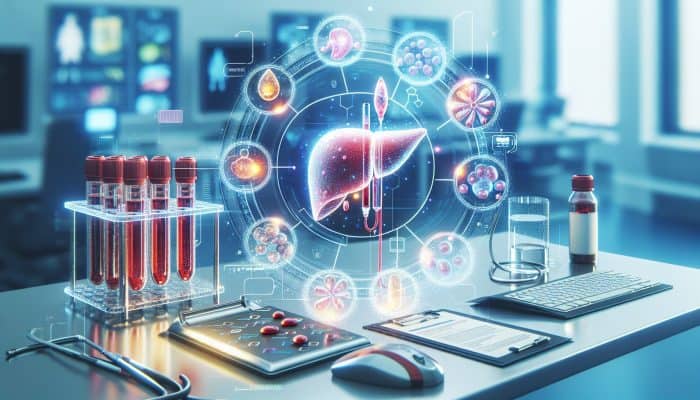A Detailed Overview of Liver Blood Testing Procedures in Blackpool
Your Step-by-Step Guide to the Liver Blood Testing Process

Undergoing a liver blood test in Blackpool is a crucial step in assessing your liver’s health and performance. This important diagnostic procedure meticulously examines several components in your bloodstream, providing critical insights into the levels of essential proteins, liver enzymes, and bilirubin. The liver is an integral organ that plays a vital role in processing nutrients, detoxifying harmful substances, and synthesising proteins necessary for blood clotting. Regular liver health monitoring through these blood tests is essential for recognising potential health issues early, which can have a significant impact on your overall health and longevity.
During your liver blood test, healthcare providers will thoroughly assess key enzymes such as alanine aminotransferase (ALT), aspartate aminotransferase (AST), alkaline phosphatase (ALP), and gamma-glutamyl transferase (GGT). Elevated levels of these enzymes can signal inflammation or damage to liver cells, warranting further investigation into possible liver diseases. Additionally, measuring bilirubin levels is crucial as increased bilirubin can lead to jaundice, which is a clear indication of liver dysfunction that requires immediate medical attention and intervention.
With liver disease rates on the rise, it is more important than ever to understand the significance of a liver blood test in Blackpool. These tests are not merely routine checks for those at risk; they also play a significant role in maintaining overall health and preventing the advancement of severe liver-related complications. By familiarising yourself with these tests, you take an active role in managing your liver health and well-being.
The Vital Role of Liver Blood Tests in Comprehensive Health Management
The importance of a liver blood test in Blackpool extends far beyond the numerical values found in medical reports. These tests are instrumental in identifying serious liver conditions such as hepatitis, Cirrhosis, and fatty liver disease. Early identification through these tests is essential for effective management and treatment options, greatly enhancing patient outcomes and quality of life.
For instance, hepatitis can manifest as either viral or autoimmune, both of which can lead to chronic liver disease if not addressed promptly. Regular liver blood testing allows healthcare professionals to detect inflammation at an early stage, facilitating timely interventions that may halt the disease’s progression. Cirrhosis, often a result of prolonged liver injury, may remain asymptomatic until it reaches an advanced stage, highlighting the need for routine testing in high-risk populations who should remain vigilant regarding their liver health.
Furthermore, the growing prevalence of Non-alcoholic fatty liver disease (NAFLD) in the UK—often linked to lifestyle choices such as poor diet and inactivity—emphasises the necessity of these evaluations. Early detection of elevated liver enzymes can instigate lifestyle changes that may reverse liver damage and avert serious complications. Thus, a liver blood test in Blackpool is not just a procedural formality but a fundamental aspect of proactive healthcare management.
How to Determine the Right Frequency for Your Liver Blood Tests
The frequency of undergoing a liver blood test in Blackpool is largely contingent upon your personal health status and specific risk factors. Individuals diagnosed with liver disease, or those classified as high-risk—such as individuals with a history of heavy alcohol consumption, obesity, or diabetes—require more frequent monitoring. In these scenarios, healthcare providers may recommend testing every six months or even more often, depending on the severity of the individual’s condition.
Conversely, individuals who do not exhibit any clear risk factors may not find it necessary to undergo regular testing. However, many healthcare professionals advocate for consistent evaluations as part of a comprehensive health assessment, particularly for those over the age of 40 or those with a family history of liver disease. Engaging in discussions with your healthcare provider can help establish a tailored testing schedule that suits your unique health profile. Regular monitoring not only aids in the early detection of potential liver issues but also reinforces your commitment to maintaining optimal liver health, making a liver blood test in Blackpool an indispensable part of health management.
Critical Preparations for Your Upcoming Liver Blood Test

Essential Steps for Effective Pre-Test Preparation
Proper preparation is crucial when gearing up for a liver blood test in Blackpool. A common requirement is fasting, which typically involves abstaining from all food and drink for 8-12 hours prior to the test. This fasting period is vital as it allows for a clearer evaluation of liver functionality without interference from recent food intake, which could skew the results and lead to inaccurate interpretations.
Patients are strongly advised to confirm specific instructions with their healthcare provider, as certain medications or supplements may need to be temporarily halted, given that they can affect liver enzyme levels. Staying adequately hydrated is also important; however, water is usually the only beverage permitted during the fasting period. It is recommended to refrain from alcohol consumption and intense exercise in the days leading up to the test, as these factors can also influence liver function and the accuracy of test results.
Understanding these preparatory steps can significantly reduce anxiety and ensure that the test results are as precise as possible. By adhering to these guidelines, patients are better prepared for a more informed conversation with their healthcare provider regarding their liver health following the test.
What to Expect During the Liver Blood Testing Procedure
The process of undergoing a liver blood test in Blackpool is typically straightforward and efficient. The procedure generally consists of a simple blood draw, which is most often performed from a vein in your arm. Healthcare professionals will first clean the area with an antiseptic wipe to minimise the risk of infection before inserting a needle to collect blood into a vial.
Although the thought of needles can be intimidating for some, the process is generally swift, lasting only a few minutes. Many clinics and hospitals utilise a tourniquet to engorge the veins, making the blood draw easier and more efficient. After the blood is collected, the technician will place a cotton ball or bandage over the site to effectively manage any bleeding.
Patients can take comfort in knowing that this procedure is routine and carried out by trained professionals who are skilled at addressing various patient concerns. Consequently, any apprehension regarding the test can largely be alleviated by recognising the simplicity and efficiency of the process involved.
Post-Test Expectations: Understanding the Next Steps

After completing your liver blood test in Blackpool, you can generally resume your normal activities without delay. Typically, there are no specific precautions required post-test, aside from adhering to any particular advice given by your healthcare provider related to your individual health circumstances.
In most cases, liver blood test results will be available within a few days. Healthcare providers often schedule follow-up appointments to discuss the results, ensuring you remain well-informed about your liver health status. This discussion is a pivotal aspect of the process, as understanding your results can significantly influence your lifestyle choices and inform any necessary follow-up actions that may be required.
It’s important to note that some individuals might experience minor bruising at the needle site, but this typically resolves quickly without the need for further intervention. Recognising that you have taken a proactive step towards monitoring your liver health can be empowering, encouraging you to actively engage in your health management journey.
A Comprehensive Approach to Interpreting Your Liver Blood Test Results
Interpreting the results of a liver blood test in Blackpool can initially seem daunting. However, your healthcare provider will help you understand your findings, clarifying what the levels of liver enzymes, proteins, and bilirubin signify in relation to your health. Normal ranges for liver enzymes typically fall within specific thresholds, which your doctor will explain, helping you to comprehend the functional status of your liver and identify any potential health risks.
If your results indicate abnormal enzyme levels, this may suggest liver damage or an existing liver condition. Based on your specific results, your doctor may recommend appropriate follow-up actions, which could include additional testing, lifestyle adjustments, or even medical treatments tailored to your individual health needs.
Furthermore, it’s crucial to remember that a single abnormal test result does not definitively indicate a serious issue. A variety of factors, including recent physical activity, medications, or even dehydration, can temporarily impact liver enzyme levels. Therefore, an in-depth discussion with your healthcare provider will aid in clarifying any concerns and determining the next appropriate steps for effectively managing your liver health.
Accessing Liver Blood Testing Services in Blackpool
Utilising NHS Resources for Convenient Liver Blood Testing in Blackpool
For those seeking a liver blood test in Blackpool, the NHS offers a range of accessible options. Local GP surgeries serve as the primary point of contact, allowing residents to arrange appointments for necessary blood tests. In many cases, your GP can assess your symptoms and recommend a liver blood test based on your medical history and current health concerns.
Blackpool Victoria Hospital is another reputable facility where individuals can undergo NHS-funded liver blood tests. As one of the leading hospitals in the region, it is equipped with the necessary resources and healthcare professionals to conduct these tests efficiently. Patients typically require a referral from their GP, ensuring that the testing process aligns with their healthcare needs.
Additionally, the NHS operates several walk-in centres throughout Blackpool, providing residents with easier access to blood tests without the need for prior appointments. This flexibility is particularly beneficial for those who may need to fit testing into their busy schedules or those seeking immediate care for health concerns.
Exploring Private Clinics for Quick Access to Liver Blood Tests in Blackpool
For individuals seeking faster access to a liver blood test in Blackpool, private clinics offer an appealing alternative. Facilities such as Spire Fylde Coast Hospital provide private blood testing services, allowing patients to schedule appointments that align with their availability.
Opting for a private clinic comes with several advantages, including shorter waiting times for appointments and quicker result turnaround. Many clinics also feature modern amenities and highly trained staff, ensuring that patients receive high-quality care throughout the testing process. Furthermore, privacy and comfort are often prioritised in private settings, providing reassurance for those who may feel anxious about medical procedures.
Patients should carefully consider the costs associated with private testing against their need for convenience and faster results. While private clinics may impose fees, the potential for quicker diagnosis and management of liver health can offer substantial benefits, especially for individuals who are proactive about their well-being and health outcomes.
Mobile Testing Services: A Convenient Solution for Liver Blood Testing
Recent advancements in healthcare have introduced mobile testing services, providing a convenient option for those requiring a liver blood test in Blackpool but unable to travel. Some companies offer home visits, where healthcare professionals come to your residence to collect the necessary blood samples.
This service is particularly advantageous for elderly patients, those with mobility challenges, or individuals managing chronic conditions who find it difficult to visit clinics. Mobile testing services ensure that quality care remains accessible, allowing more individuals to keep track of their liver health without the added stress of travel.
Once the sample is collected, it is sent to a laboratory for analysis, with results typically available within a few days. Patients can then discuss their findings with their healthcare provider, either via telephone or in-person consultations, ensuring continuity of care and support throughout the entire process.
Understanding and Interpreting Your Liver Blood Test Results
Normal Ranges: Essential Information for Accurate Interpretation
Understanding what constitutes normal ranges in a liver blood test in Blackpool is vital for accurately interpreting your results. Each laboratory may establish slightly different reference ranges based on their equipment and methodologies; however, liver enzymes such as ALT and AST generally should fall between 7-56 and 10-40 units per litre, respectively.
Normal bilirubin levels typically range from 0.1 to 1.2 mg/dL. If your results are within these ranges, it usually indicates that your liver is functioning optimally. Nevertheless, it is important to interpret these figures in context; the interpretation should always consider individual health factors, symptoms, and medical history.
Your healthcare provider will guide you through these numbers, clarifying their significance in relation to your overall health. This comprehensive understanding empowers you to make informed decisions concerning lifestyle adjustments or further medical actions that may be necessary to maintain your liver health effectively.
Understanding Abnormal Results and Their Health Implications
If your liver blood test in Blackpool yields abnormal results, it does not automatically indicate a severe illness. Elevated liver enzyme levels can signify inflammation, damage, or diseases affecting the liver; however, they may also arise from various other factors, such as medications, excessive physical activity, or specific infections.
Elevated levels of ALT and AST are often the initial markers that require further investigation. Your doctor may recommend additional tests such as imaging studies or liver biopsies to determine the underlying cause. A holistic approach is crucial; understanding the complete clinical picture is necessary for reaching an accurate diagnosis and developing an effective management plan.
Should your results suggest liver disease, your healthcare provider will guide you through potential treatment options or lifestyle modifications aimed at improving your liver health. Prompt intervention is critical; addressing abnormal results quickly can significantly affect long-term health outcomes and enhance your overall well-being.
Next Steps After Receiving Your Liver Blood Test Results
Following a liver blood test in Blackpool, understanding the subsequent steps is essential. If your results are normal, your healthcare provider may suggest routine monitoring to ensure ongoing health. However, if your results indicate abnormalities, your doctor will outline the next steps, which may include further testing or referrals to specialists such as hepatologists.
It is equally important to contemplate lifestyle changes that can bolster liver health. Depending on your results, your healthcare provider may recommend dietary adjustments, exercise plans, or even medications. The key is to stay actively involved in your health management process to optimise outcomes and support your liver health effectively.
Your healthcare journey does not conclude with the test; maintaining open lines of communication with your healthcare provider is vital. They are available to address your queries, provide guidance, and help you navigate your health journey efficiently for the best possible outcomes.
Common Liver Conditions Identified Through Blood Testing
Diagnosing Hepatitis: Recognising the Associated Risks
Hepatitis, characterised by liver inflammation, can be diagnosed through a liver blood test in Blackpool. Identifying specific viral markers in the blood can confirm whether an individual is suffering from viral hepatitis, such as Hepatitis B or C. These infections can stem from various sources, including unprotected sexual contact, sharing needles, or maternal transmission during childbirth.
Routine testing is crucial for early detection, as many individuals with chronic hepatitis may remain asymptomatic for extended periods. Elevated liver enzymes detected in blood tests can indicate inflammation, prompting further investigations. Early diagnosis allows for timely antiviral treatments that can manage or even eradicate the virus, significantly reducing the risk of long-term complications such as cirrhosis or liver cancer.
In the UK, healthcare providers advocate for regular screenings for high-risk populations to ensure that hepatitis can be identified and treated before it leads to serious harm to liver health and overall wellbeing.
Identifying Cirrhosis: Recognising the Silent Threat to Your Health
cirrhosis, characterised by irreversible liver scarring, can also be diagnosed through a liver blood test in Blackpool. This condition often develops as a consequence of chronic liver disease, including chronic hepatitis or excessive alcohol consumption. Blood tests may reveal elevated liver enzymes, indicating liver damage that could progress to cirrhosis over time if not managed appropriately.
Recognising the signs and symptoms of cirrhosis—such as fatigue, jaundice, and abdominal swelling—is vital for early detection. If a blood test suggests potential cirrhosis, healthcare providers may recommend further imaging studies or biopsies to assess the extent of liver damage and formulate a suitable management plan tailored to the patient’s needs.
Managing cirrhosis involves addressing the underlying cause and making necessary lifestyle changes. Early intervention is critical; the sooner cirrhosis is detected, the better the chances of effectively managing the condition and preserving liver function for a healthier future.
Increasing Awareness of Fatty Liver Disease: Importance of Prevention and Management
Non-alcoholic fatty liver disease (NAFLD) is becoming increasingly prevalent, particularly among populations with high rates of obesity and metabolic syndrome. A liver blood test in Blackpool can uncover elevated liver enzymes that suggest the presence of fatty liver. NAFLD often goes unnoticed until liver function tests are conducted, underscoring the importance of regular testing for early identification and intervention.
This condition can evolve into non-alcoholic steatohepatitis (NASH), which carries a heightened risk of cirrhosis and liver cancer. Patients diagnosed with NAFLD are typically advised to implement lifestyle changes such as weight loss, dietary adjustments, and increased physical activity to better manage their condition. Consistent monitoring of liver enzymes and function is essential to ensure that the condition does not progress to more severe stages.
The rising concern about liver health highlights the critical nature of blood tests in identifying potential risks and intervening early to promote improved long-term health outcomes for individuals at risk.
Key Lifestyle Factors That Impact Liver Health
Enhancing Liver Health Through Optimal Nutrition and Diet
Nutrition is fundamental in supporting liver health and significantly influences the risk of developing conditions such as non-alcoholic fatty liver disease. A balanced diet rich in fruits, vegetables, whole grains, and healthy fats is essential for maintaining optimal liver function. Foods high in sugar and unhealthy fats can lead to fat accumulation within the liver, thereby increasing the risk of liver disease and other health complications.
Limiting alcohol consumption is equally essential. Excessive alcohol intake is a leading cause of liver damage, contributing to conditions such as alcoholic liver disease and cirrhosis. Individuals with liver health concerns should consult with their healthcare providers about suitable dietary choices that support liver health, ensuring they are equipped with the knowledge necessary to make informed lifestyle decisions for improved outcomes.
Incorporating nutrient-dense foods, such as leafy greens, fish rich in omega-3 fatty acids, and lean proteins, can significantly enhance liver function while reducing the risk of liver diseases. Understanding the connection between diet and liver health is a powerful tool for promoting wellness and effectively preventing liver-related diseases.
The Essential Role of Regular Exercise and Weight Management
Regular physical activity is crucial for maintaining liver health, particularly in preventing non-alcoholic fatty liver disease. Engaging in exercise aids weight loss, improves insulin sensitivity, and reduces liver fat, making it a critical aspect of lifestyle management for those at risk of liver-related issues.
Health professionals recommend at least 150 minutes of moderate aerobic activity each week, coupled with strength training exercises. These activities not only assist in managing body weight but also enhance overall metabolic health, which is closely linked to liver function and well-being.
For individuals with existing liver conditions, tailored exercise regimens may be necessary. Consulting with healthcare providers can help develop a suitable plan that balances physical activity with individual health considerations, ensuring optimal results for long-term health and wellness.
By committing to regular exercise and maintaining a healthy weight, individuals can significantly improve their liver health, overall quality of life, and reduce the risk of liver-related diseases.
Minimising Exposure to Harmful Toxins for Enhanced Liver Protection
Reducing exposure to harmful substances is essential for safeguarding liver health. Numerous toxins, including alcohol, certain medications, and environmental pollutants, can overwhelm the liver’s detoxification capabilities, leading to damage. A liver blood test in Blackpool may indicate the consequences of toxin exposure through elevated liver enzymes, prompting necessary lifestyle changes to mitigate such risks.
Being mindful of the medications you take is equally crucial; some over-the-counter and prescription drugs can adversely impact liver function, especially when used excessively or without medical guidance. Always consult with healthcare providers before starting or discontinuing any medications, particularly if you have concerns about liver health.
Moreover, minimising exposure to environmental toxins—such as heavy metals and industrial chemicals—can further protect liver function. Taking proactive measures to limit exposure to these harmful substances can significantly enhance overall liver health and longevity, promoting a healthier lifestyle.
Prioritising Quality Sleep and Effective Stress Management for Optimal Liver Wellness
The relationship between sleep quality, stress management, and liver health is increasingly being recognised. Chronic sleep deprivation and elevated stress levels can adversely affect liver function and contribute to the development of liver diseases. Prioritising quality sleep and implementing stress-reduction techniques, such as mindfulness or yoga, can significantly enhance liver health and overall well-being.
Sleep plays a vital role in the body’s detoxification processes, allowing the liver to recover and function optimally. Establishing a consistent sleep routine and creating a restful environment are crucial steps in promoting restorative sleep and improving overall health.
Effective stress management is equally important; chronic stress can lead to unhealthy coping mechanisms, such as overeating or substance abuse, which can further strain liver health. Incorporating relaxation techniques into daily life can help mitigate stress and foster a healthier lifestyle for better health outcomes.
By recognising the impact of sleep and stress on liver health, individuals can take proactive measures to enhance their overall well-being and health outcomes for a healthier life.
Resources and Support for Improving Liver Health in Blackpool
Connecting with Local Support Groups for Liver Health Assistance
In Blackpool, various local support groups offer invaluable resources for individuals facing liver health challenges. Engaging with these groups can provide essential emotional support and practical advice for navigating the complexities associated with liver conditions. These support networks empower individuals to share experiences, learn from each other, and cultivate a sense of community and belonging that is vital during health challenges.
Local health organisations may also provide educational resources, workshops, and seminars aimed at raising awareness of liver health. Participating in these initiatives can help individuals gain a deeper understanding of liver conditions, prevention strategies, and the treatment options available to them.
By connecting with local support groups, those affected by liver health issues can find a network of understanding and encouragement that can significantly enhance their journey towards improved health and quality of life.
Frequently Asked Questions About Liver Blood Testing
What does a liver blood test check for?
A liver blood test measures levels of liver enzymes, proteins, and bilirubin in the blood to evaluate liver function and identify potential liver conditions that may necessitate further investigation and management.
How long does a liver blood test take?
The blood draw for a liver blood test typically takes only a few minutes; however, results may take several days to process, depending on the laboratory’s workload and testing protocols.
Do I need to fast before a liver blood test?
Yes, fasting for 8-12 hours before the test is usually required to ensure accurate results, although specific instructions may vary based on individual circumstances and healthcare provider recommendations.
What factors can affect liver blood test results?
Factors such as recent physical activity, medications, alcohol consumption, and even dehydration can all influence the accuracy of liver blood test results. This underscores the importance of proper preparation before the test to ensure reliable outcomes.
How often should I have a liver blood test?
The frequency of testing is determined by individual health status; individuals with liver disease may require more regular tests, while others may only need occasional checks as recommended by their healthcare provider based on their risk factors and health history.
Where can I access a liver blood test in Blackpool?
You can obtain a liver blood test through local NHS GP surgeries, hospitals such as Blackpool Victoria Hospital, or private clinics like Spire Fylde Coast Hospital, offering various options to suit your testing needs and preferences.
What happens if my liver blood test results are abnormal?
Abnormal results may indicate liver damage or disease; your healthcare provider will suggest further testing or treatment based on your findings to ensure appropriate management of your liver health and mitigate any potential risks.
Can lifestyle changes improve liver health?
Absolutely, adopting a healthy diet, engaging in regular exercise, and avoiding toxins can significantly enhance liver health and reduce the risk of liver disease, contributing to overall wellness and improved quality of life.
What are the signs of liver disease?
Common signs of liver disease include fatigue, jaundice, abdominal swelling, and unexplained weight loss. Regular testing can aid in early detection and intervention, improving health outcomes and overall well-being.
Are there support groups for liver health in Blackpool?
Yes, various local support groups provide resources, community, and assistance for individuals dealing with liver health issues in Blackpool, fostering a supportive environment for those affected by liver conditions.
Connect with us on Facebook!
This Article Was First Found On https://bloodtest.co.uk
The Article Liver Blood Test Insights: What You Need to Know in Blackpool Was Found On https://limitsofstrategy.com
References:
Liver Blood Test Insights: What You Need to Know in Blackpool

